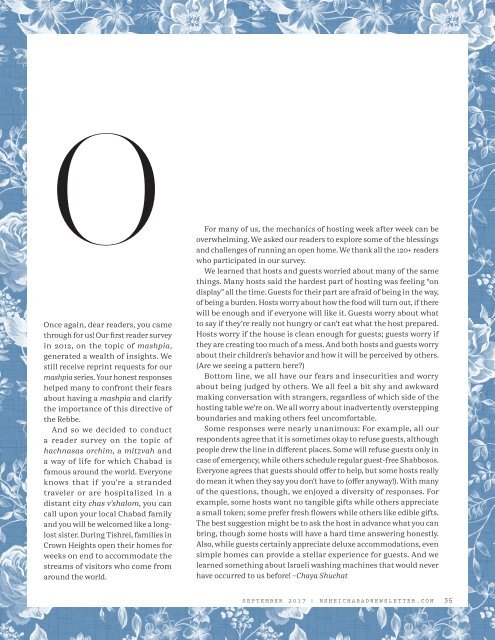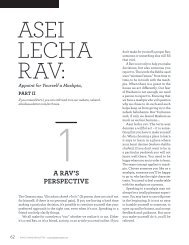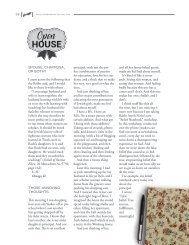You also want an ePaper? Increase the reach of your titles
YUMPU automatically turns print PDFs into web optimized ePapers that Google loves.
O<br />
Once again, dear readers, you came<br />
through for us! Our first reader survey<br />
in 2012, on the topic of mashpia,<br />
generated a wealth of insights. We<br />
still receive reprint requests for our<br />
mashpia series. Your honest responses<br />
helped many to confront their fears<br />
about having a mashpia and clarify<br />
the importance of this directive of<br />
the Rebbe.<br />
And so we decided to conduct<br />
a reader survey on the topic of<br />
hachnasas orchim, a mitzvah and<br />
a way of life for which Chabad is<br />
famous around the world. Everyone<br />
knows that if you’re a stranded<br />
traveler or are hospitalized in a<br />
distant city chas v’shalom, you can<br />
call upon your local Chabad family<br />
and you will be welcomed like a longlost<br />
sister. During Tishrei, families in<br />
Crown Heights open their homes for<br />
weeks on end to accommodate the<br />
streams of visitors who come from<br />
around the world.<br />
For many of us, the mechanics of hosting week after week can be<br />
overwhelming. We asked our readers to explore some of the blessings<br />
and challenges of running an open home. We thank all the 120+ readers<br />
who participated in our survey.<br />
We learned that hosts and guests worried about many of the same<br />
things. Many hosts said the hardest part of hosting was feeling “on<br />
display” all the time. Guests for their part are afraid of being in the way,<br />
of being a burden. Hosts worry about how the food will turn out, if there<br />
will be enough and if everyone will like it. Guests worry about what<br />
to say if they’re really not hungry or can’t eat what the host prepared.<br />
Hosts worry if the house is clean enough for guests; guests worry if<br />
they are creating too much of a mess. And both hosts and guests worry<br />
about their children’s behavior and how it will be perceived by others.<br />
(Are we seeing a pattern here?)<br />
Bottom line, we all have our fears and insecurities and worry<br />
about being judged by others. We all feel a bit shy and awkward<br />
making conversation with strangers, regardless of which side of the<br />
hosting table we’re on. We all worry about inadvertently overstepping<br />
boundaries and making others feel uncomfortable.<br />
Some responses were nearly unanimous: For example, all our<br />
respondents agree that it is sometimes okay to refuse guests, although<br />
people drew the line in different places. Some will refuse guests only in<br />
case of emergency, while others schedule regular guest-free Shabbosos.<br />
Everyone agrees that guests should offer to help, but some hosts really<br />
do mean it when they say you don’t have to (offer anyway!). With many<br />
of the questions, though, we enjoyed a diversity of responses. For<br />
example, some hosts want no tangible gifts while others appreciate<br />
a small token; some prefer fresh flowers while others like edible gifts.<br />
The best suggestion might be to ask the host in advance what you can<br />
bring, though some hosts will have a hard time answering honestly.<br />
Also, while guests certainly appreciate deluxe accommodations, even<br />
simple homes can provide a stellar experience for guests. And we<br />
learned something about Israeli washing machines that would never<br />
have occurred to us before! –Chaya Shuchat<br />
SEPTEMBER 2017 | NSHEICHABADNEWSLETTER.COM 35

















